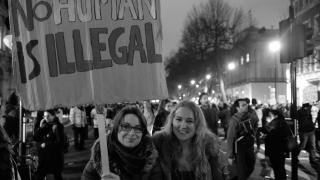
**Update: Lord Wood's reaction to President Trump's revised travel ban**
President Trump's revised travel ban confirms a worrying disregard for the US's international treaty obligations on refugees and non-discrimination.
The new order provides welcome clarification that its restrictions do not apply to refugees already approved by the State department, and rightly lifts its predecessor's blanket ban on all Syrian refugees.
But in reinstating the 90-day ban for citizens from six mainly Muslim countries, it flies in the face of the spirit and letter of numerous international law obligations of the US (such as the 1969 International Convention on the Elimination of all Forms of Racial Discrimination). And President Trump's confirmation of a 120-day block on all refugees entering the US calls into serious question the US's commitment to the UN Refugee Convention.
It is difficult to avoid the conclusion that in targeting a handful of predominantly Muslim nations, the intention of the executive order remains deliberately discriminatory.
Original article
20 February 2017
When President Trump issued his Executive Orders suspending the US Refugee Admission Program for 120 days, and banning entry to all citizens of Iraq, Syria, Iran, Libya, Somalia, Sudan and Yemen for 90 days, the outcry across the world was deafening. The move was accused of being racist, counterproductive, un-American – and it only took a week for a federal court to overturn the ban, condemning it as incompatible with US constitutional law.
But one crucial dimension of the Order – a new draft of which is due to be released soon – is the question of its compatibility with international law. How does Trump’s move sit alongside the US’s treaty commitments?
The answer is: very uneasily (at best). Let’s start with the UN Refugee Convention. In 1980, the US Congress enacted the Refugee Act, which transposed the 1967 update of the original 1951 Convention into US law. Article 3 of the Convention is crystal clear about signatories’ responsibilities: they must “apply the provisions… to refugees without discrimination as to race, religion or country of origin”. The incompatibility of Trump’s Order with this stipulation was famously spelt out to the President by German Chancellor Angela Merkel in their first telephone conversation.
Trump’s suspension of the Refugee Program also violates the principle of non-refoulement – the fundamental refugee legal principle, captured within the Convention (Article 33) but in fact obligatory outside it too. It states that countries must not return someone “to the frontiers of territories where his life or freedom would be threatened on account of his race, religion, nationality, membership of a particular social group or political opinion”.
Outside of the Refugee Convention, the violations continue. The International Covenant on Civil and Political Rights – a core human rights treaty which has been in force since 1976 – requires countries not to take any action that involves discrimination “solely on the ground of race, colour, sex, language, religion or origin” – even in a “time of public emergency which threatens the life of the nation”.
In response to concerns about persisting anti-Semitism, the International Convention on the Elimination of All Forms of Racial Discrimination, which came into force in 1969, commits signatories to “guarantee the right of everyone, without distinction as to race, colour, or national and ethnic origin, to equality before the law”. The US is voluntarily bound by both the 1976 Covenant and the 1969 Convention, and Trump’s Executive Order contravenes both.
The UN has been swift in making clear the unacceptability of Trump’s decision. Zeid Ra’ad Al Hussein, UN High Commissioner for Human Rights, commented that “discrimination on nationality alone is forbidden under human rights law”, adding that the ‘Muslim ban’ was “mean-spirited and wastes resources needed for proper counter-terrorism”.
A joint statement by the UN Refugee Agency and International Organisation for Migration gently reminded the US that it had benefited from the contribution of refugees to American life for generations, and of its obligations to provide equal treatment to those fleeing persecution and seeking protection and assistance.
Most bluntly of all, António Guterres, the UN’s new Secretary-General, remarked that the Executive Orders “violate our basic principles... [and] are not effective if the objective is to indeed avoid terrorists entering the United States”.
But among all the reasons for objecting to Trump’s ripping up of the rule book on admitting refugees, why should we care about the way it tramples on international conventions?
Partly because the authority of these conventions is seriously damaged when the powerful countries act with wilful disregard of their provisions. Partly because there is a particular responsibility of the UN Security Council’s permanent, veto-wielding members to uphold the Conventions on which international law rests.
But those countries that fail to uphold the rules-based international order should also remember that when they next want to challenge flagrant abuses by other states, their authority to take the lead will have been damaged by their own transgression and hypocrisy.
Lord Wood of Anfield, UNA-UK Chair






